Political and Economic Factors Behind Venezuela's Current Crisis
VerifiedAdded on 2023/06/10
|8
|2144
|497
Report
AI Summary
This report examines the historical, political, and economic factors contributing to Venezuela's current crisis. It discusses the resource curse, theories of development and change, the impact of globalization, and the rise of authoritarianism under Hugo Chavez and Nicolas Maduro. The analysis covers the economic mismanagement, corruption, and political oppression that have led to hyperinflation, poverty, and a humanitarian crisis. Furthermore, the report assesses the implications of Venezuela's instability on American national security, including increased migration and potential security threats. The report concludes by emphasizing the need for institution building and international cooperation to promote democracy and economic recovery in Venezuela.
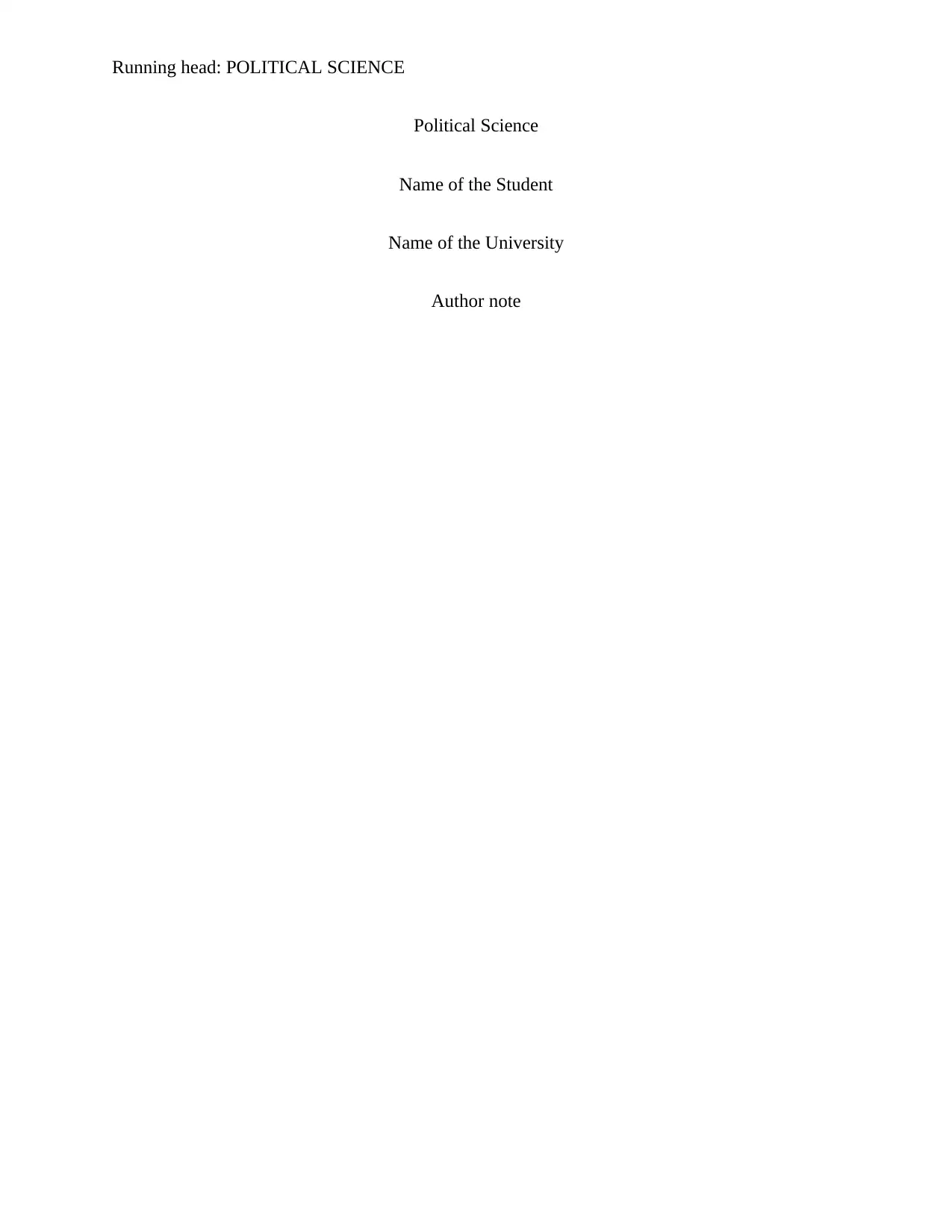
Running head: POLITICAL SCIENCE
Political Science
Name of the Student
Name of the University
Author note
Political Science
Name of the Student
Name of the University
Author note
Paraphrase This Document
Need a fresh take? Get an instant paraphrase of this document with our AI Paraphraser
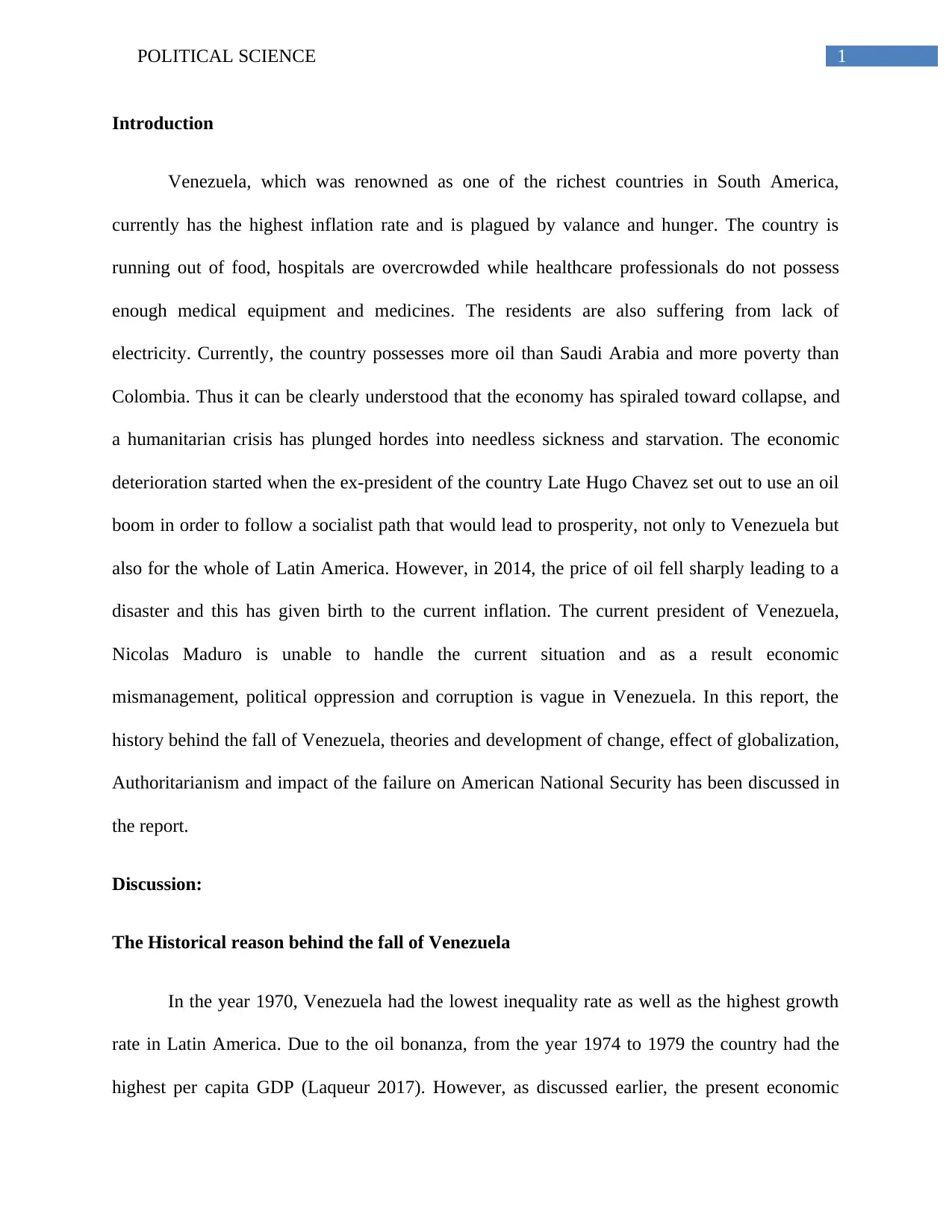
1POLITICAL SCIENCE
Introduction
Venezuela, which was renowned as one of the richest countries in South America,
currently has the highest inflation rate and is plagued by valance and hunger. The country is
running out of food, hospitals are overcrowded while healthcare professionals do not possess
enough medical equipment and medicines. The residents are also suffering from lack of
electricity. Currently, the country possesses more oil than Saudi Arabia and more poverty than
Colombia. Thus it can be clearly understood that the economy has spiraled toward collapse, and
a humanitarian crisis has plunged hordes into needless sickness and starvation. The economic
deterioration started when the ex-president of the country Late Hugo Chavez set out to use an oil
boom in order to follow a socialist path that would lead to prosperity, not only to Venezuela but
also for the whole of Latin America. However, in 2014, the price of oil fell sharply leading to a
disaster and this has given birth to the current inflation. The current president of Venezuela,
Nicolas Maduro is unable to handle the current situation and as a result economic
mismanagement, political oppression and corruption is vague in Venezuela. In this report, the
history behind the fall of Venezuela, theories and development of change, effect of globalization,
Authoritarianism and impact of the failure on American National Security has been discussed in
the report.
Discussion:
The Historical reason behind the fall of Venezuela
In the year 1970, Venezuela had the lowest inequality rate as well as the highest growth
rate in Latin America. Due to the oil bonanza, from the year 1974 to 1979 the country had the
highest per capita GDP (Laqueur 2017). However, as discussed earlier, the present economic
Introduction
Venezuela, which was renowned as one of the richest countries in South America,
currently has the highest inflation rate and is plagued by valance and hunger. The country is
running out of food, hospitals are overcrowded while healthcare professionals do not possess
enough medical equipment and medicines. The residents are also suffering from lack of
electricity. Currently, the country possesses more oil than Saudi Arabia and more poverty than
Colombia. Thus it can be clearly understood that the economy has spiraled toward collapse, and
a humanitarian crisis has plunged hordes into needless sickness and starvation. The economic
deterioration started when the ex-president of the country Late Hugo Chavez set out to use an oil
boom in order to follow a socialist path that would lead to prosperity, not only to Venezuela but
also for the whole of Latin America. However, in 2014, the price of oil fell sharply leading to a
disaster and this has given birth to the current inflation. The current president of Venezuela,
Nicolas Maduro is unable to handle the current situation and as a result economic
mismanagement, political oppression and corruption is vague in Venezuela. In this report, the
history behind the fall of Venezuela, theories and development of change, effect of globalization,
Authoritarianism and impact of the failure on American National Security has been discussed in
the report.
Discussion:
The Historical reason behind the fall of Venezuela
In the year 1970, Venezuela had the lowest inequality rate as well as the highest growth
rate in Latin America. Due to the oil bonanza, from the year 1974 to 1979 the country had the
highest per capita GDP (Laqueur 2017). However, as discussed earlier, the present economic
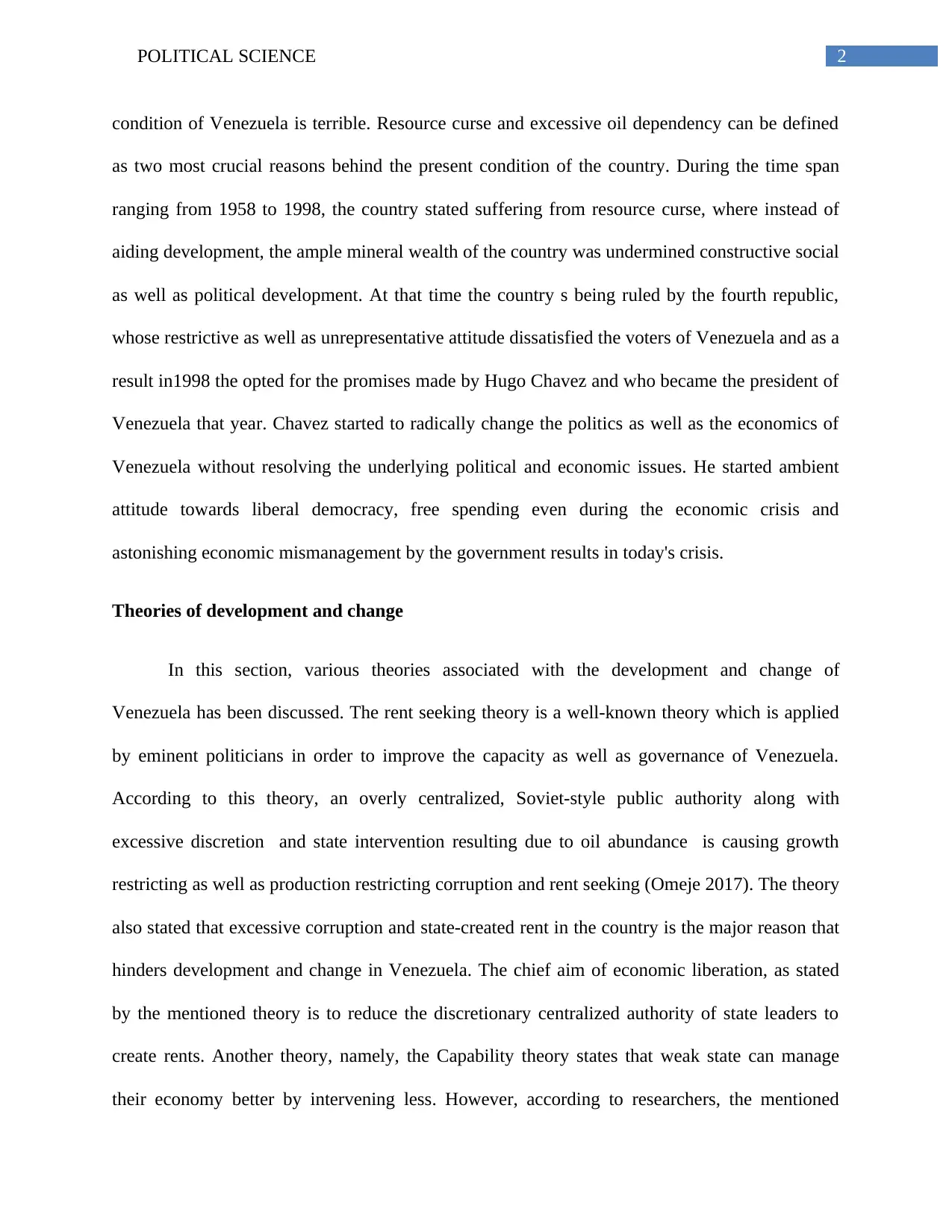
2POLITICAL SCIENCE
condition of Venezuela is terrible. Resource curse and excessive oil dependency can be defined
as two most crucial reasons behind the present condition of the country. During the time span
ranging from 1958 to 1998, the country stated suffering from resource curse, where instead of
aiding development, the ample mineral wealth of the country was undermined constructive social
as well as political development. At that time the country s being ruled by the fourth republic,
whose restrictive as well as unrepresentative attitude dissatisfied the voters of Venezuela and as a
result in1998 the opted for the promises made by Hugo Chavez and who became the president of
Venezuela that year. Chavez started to radically change the politics as well as the economics of
Venezuela without resolving the underlying political and economic issues. He started ambient
attitude towards liberal democracy, free spending even during the economic crisis and
astonishing economic mismanagement by the government results in today's crisis.
Theories of development and change
In this section, various theories associated with the development and change of
Venezuela has been discussed. The rent seeking theory is a well-known theory which is applied
by eminent politicians in order to improve the capacity as well as governance of Venezuela.
According to this theory, an overly centralized, Soviet-style public authority along with
excessive discretion and state intervention resulting due to oil abundance is causing growth
restricting as well as production restricting corruption and rent seeking (Omeje 2017). The theory
also stated that excessive corruption and state-created rent in the country is the major reason that
hinders development and change in Venezuela. The chief aim of economic liberation, as stated
by the mentioned theory is to reduce the discretionary centralized authority of state leaders to
create rents. Another theory, namely, the Capability theory states that weak state can manage
their economy better by intervening less. However, according to researchers, the mentioned
condition of Venezuela is terrible. Resource curse and excessive oil dependency can be defined
as two most crucial reasons behind the present condition of the country. During the time span
ranging from 1958 to 1998, the country stated suffering from resource curse, where instead of
aiding development, the ample mineral wealth of the country was undermined constructive social
as well as political development. At that time the country s being ruled by the fourth republic,
whose restrictive as well as unrepresentative attitude dissatisfied the voters of Venezuela and as a
result in1998 the opted for the promises made by Hugo Chavez and who became the president of
Venezuela that year. Chavez started to radically change the politics as well as the economics of
Venezuela without resolving the underlying political and economic issues. He started ambient
attitude towards liberal democracy, free spending even during the economic crisis and
astonishing economic mismanagement by the government results in today's crisis.
Theories of development and change
In this section, various theories associated with the development and change of
Venezuela has been discussed. The rent seeking theory is a well-known theory which is applied
by eminent politicians in order to improve the capacity as well as governance of Venezuela.
According to this theory, an overly centralized, Soviet-style public authority along with
excessive discretion and state intervention resulting due to oil abundance is causing growth
restricting as well as production restricting corruption and rent seeking (Omeje 2017). The theory
also stated that excessive corruption and state-created rent in the country is the major reason that
hinders development and change in Venezuela. The chief aim of economic liberation, as stated
by the mentioned theory is to reduce the discretionary centralized authority of state leaders to
create rents. Another theory, namely, the Capability theory states that weak state can manage
their economy better by intervening less. However, according to researchers, the mentioned
⊘ This is a preview!⊘
Do you want full access?
Subscribe today to unlock all pages.

Trusted by 1+ million students worldwide
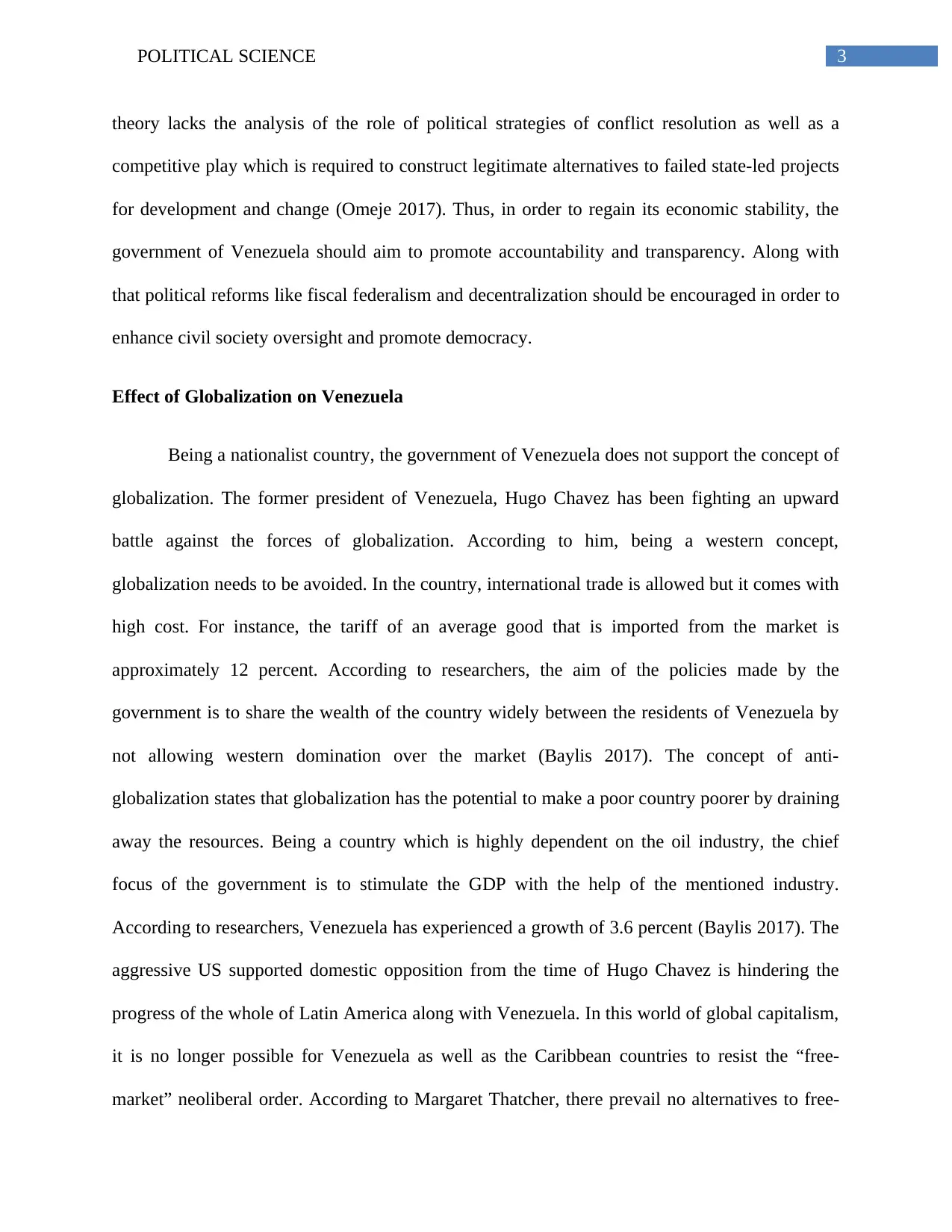
3POLITICAL SCIENCE
theory lacks the analysis of the role of political strategies of conflict resolution as well as a
competitive play which is required to construct legitimate alternatives to failed state-led projects
for development and change (Omeje 2017). Thus, in order to regain its economic stability, the
government of Venezuela should aim to promote accountability and transparency. Along with
that political reforms like fiscal federalism and decentralization should be encouraged in order to
enhance civil society oversight and promote democracy.
Effect of Globalization on Venezuela
Being a nationalist country, the government of Venezuela does not support the concept of
globalization. The former president of Venezuela, Hugo Chavez has been fighting an upward
battle against the forces of globalization. According to him, being a western concept,
globalization needs to be avoided. In the country, international trade is allowed but it comes with
high cost. For instance, the tariff of an average good that is imported from the market is
approximately 12 percent. According to researchers, the aim of the policies made by the
government is to share the wealth of the country widely between the residents of Venezuela by
not allowing western domination over the market (Baylis 2017). The concept of anti-
globalization states that globalization has the potential to make a poor country poorer by draining
away the resources. Being a country which is highly dependent on the oil industry, the chief
focus of the government is to stimulate the GDP with the help of the mentioned industry.
According to researchers, Venezuela has experienced a growth of 3.6 percent (Baylis 2017). The
aggressive US supported domestic opposition from the time of Hugo Chavez is hindering the
progress of the whole of Latin America along with Venezuela. In this world of global capitalism,
it is no longer possible for Venezuela as well as the Caribbean countries to resist the “free-
market” neoliberal order. According to Margaret Thatcher, there prevail no alternatives to free-
theory lacks the analysis of the role of political strategies of conflict resolution as well as a
competitive play which is required to construct legitimate alternatives to failed state-led projects
for development and change (Omeje 2017). Thus, in order to regain its economic stability, the
government of Venezuela should aim to promote accountability and transparency. Along with
that political reforms like fiscal federalism and decentralization should be encouraged in order to
enhance civil society oversight and promote democracy.
Effect of Globalization on Venezuela
Being a nationalist country, the government of Venezuela does not support the concept of
globalization. The former president of Venezuela, Hugo Chavez has been fighting an upward
battle against the forces of globalization. According to him, being a western concept,
globalization needs to be avoided. In the country, international trade is allowed but it comes with
high cost. For instance, the tariff of an average good that is imported from the market is
approximately 12 percent. According to researchers, the aim of the policies made by the
government is to share the wealth of the country widely between the residents of Venezuela by
not allowing western domination over the market (Baylis 2017). The concept of anti-
globalization states that globalization has the potential to make a poor country poorer by draining
away the resources. Being a country which is highly dependent on the oil industry, the chief
focus of the government is to stimulate the GDP with the help of the mentioned industry.
According to researchers, Venezuela has experienced a growth of 3.6 percent (Baylis 2017). The
aggressive US supported domestic opposition from the time of Hugo Chavez is hindering the
progress of the whole of Latin America along with Venezuela. In this world of global capitalism,
it is no longer possible for Venezuela as well as the Caribbean countries to resist the “free-
market” neoliberal order. According to Margaret Thatcher, there prevail no alternatives to free-
Paraphrase This Document
Need a fresh take? Get an instant paraphrase of this document with our AI Paraphraser
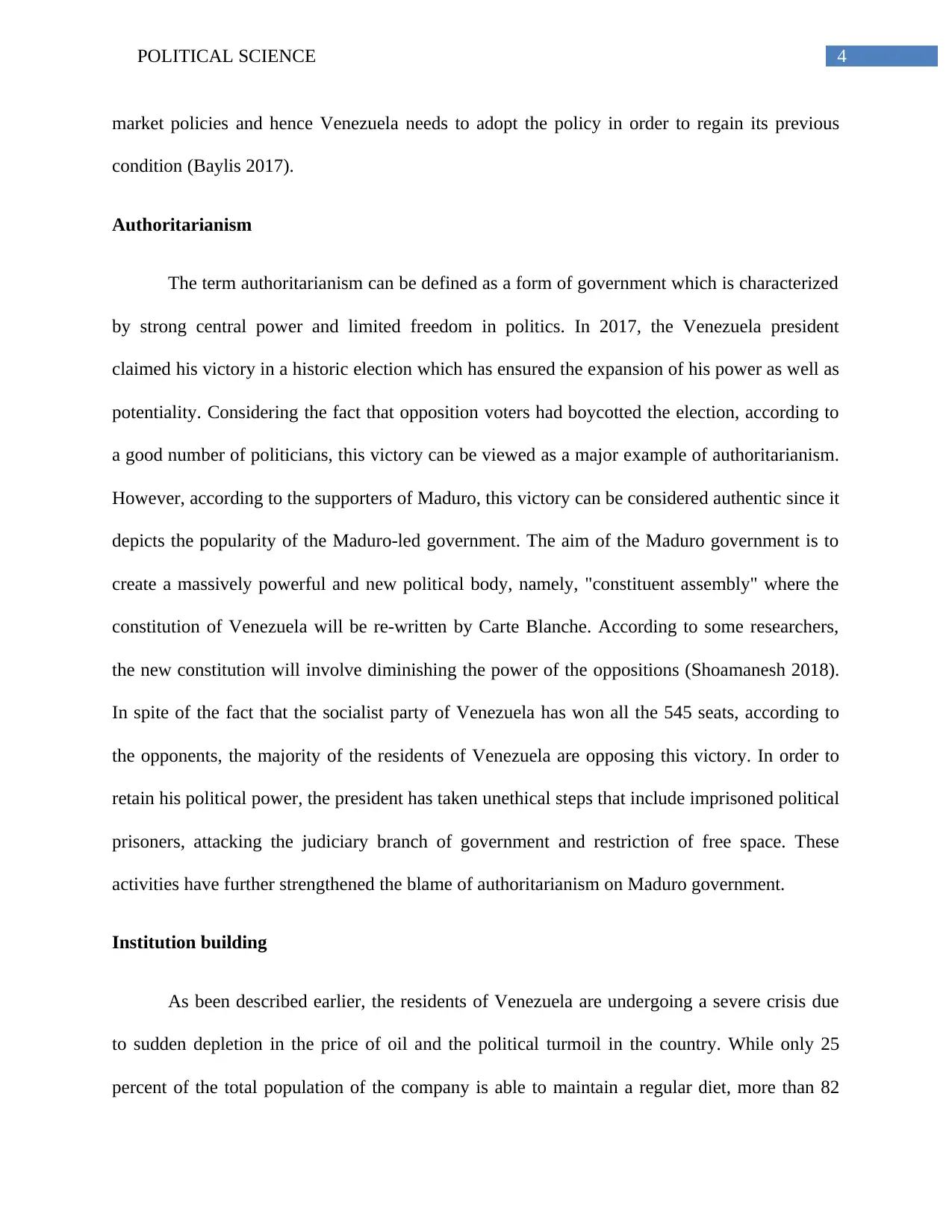
4POLITICAL SCIENCE
market policies and hence Venezuela needs to adopt the policy in order to regain its previous
condition (Baylis 2017).
Authoritarianism
The term authoritarianism can be defined as a form of government which is characterized
by strong central power and limited freedom in politics. In 2017, the Venezuela president
claimed his victory in a historic election which has ensured the expansion of his power as well as
potentiality. Considering the fact that opposition voters had boycotted the election, according to
a good number of politicians, this victory can be viewed as a major example of authoritarianism.
However, according to the supporters of Maduro, this victory can be considered authentic since it
depicts the popularity of the Maduro-led government. The aim of the Maduro government is to
create a massively powerful and new political body, namely, "constituent assembly" where the
constitution of Venezuela will be re-written by Carte Blanche. According to some researchers,
the new constitution will involve diminishing the power of the oppositions (Shoamanesh 2018).
In spite of the fact that the socialist party of Venezuela has won all the 545 seats, according to
the opponents, the majority of the residents of Venezuela are opposing this victory. In order to
retain his political power, the president has taken unethical steps that include imprisoned political
prisoners, attacking the judiciary branch of government and restriction of free space. These
activities have further strengthened the blame of authoritarianism on Maduro government.
Institution building
As been described earlier, the residents of Venezuela are undergoing a severe crisis due
to sudden depletion in the price of oil and the political turmoil in the country. While only 25
percent of the total population of the company is able to maintain a regular diet, more than 82
market policies and hence Venezuela needs to adopt the policy in order to regain its previous
condition (Baylis 2017).
Authoritarianism
The term authoritarianism can be defined as a form of government which is characterized
by strong central power and limited freedom in politics. In 2017, the Venezuela president
claimed his victory in a historic election which has ensured the expansion of his power as well as
potentiality. Considering the fact that opposition voters had boycotted the election, according to
a good number of politicians, this victory can be viewed as a major example of authoritarianism.
However, according to the supporters of Maduro, this victory can be considered authentic since it
depicts the popularity of the Maduro-led government. The aim of the Maduro government is to
create a massively powerful and new political body, namely, "constituent assembly" where the
constitution of Venezuela will be re-written by Carte Blanche. According to some researchers,
the new constitution will involve diminishing the power of the oppositions (Shoamanesh 2018).
In spite of the fact that the socialist party of Venezuela has won all the 545 seats, according to
the opponents, the majority of the residents of Venezuela are opposing this victory. In order to
retain his political power, the president has taken unethical steps that include imprisoned political
prisoners, attacking the judiciary branch of government and restriction of free space. These
activities have further strengthened the blame of authoritarianism on Maduro government.
Institution building
As been described earlier, the residents of Venezuela are undergoing a severe crisis due
to sudden depletion in the price of oil and the political turmoil in the country. While only 25
percent of the total population of the company is able to maintain a regular diet, more than 82
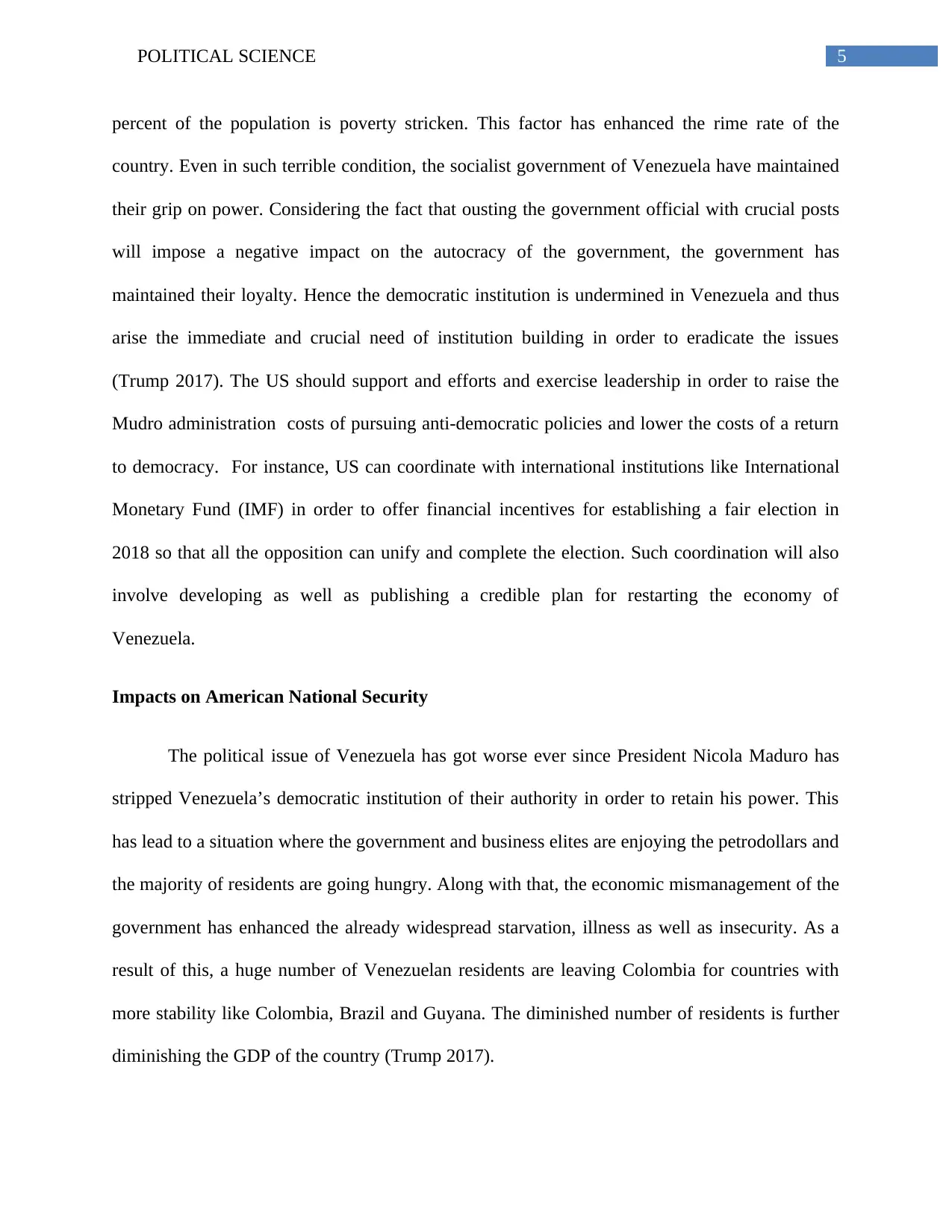
5POLITICAL SCIENCE
percent of the population is poverty stricken. This factor has enhanced the rime rate of the
country. Even in such terrible condition, the socialist government of Venezuela have maintained
their grip on power. Considering the fact that ousting the government official with crucial posts
will impose a negative impact on the autocracy of the government, the government has
maintained their loyalty. Hence the democratic institution is undermined in Venezuela and thus
arise the immediate and crucial need of institution building in order to eradicate the issues
(Trump 2017). The US should support and efforts and exercise leadership in order to raise the
Mudro administration costs of pursuing anti-democratic policies and lower the costs of a return
to democracy. For instance, US can coordinate with international institutions like International
Monetary Fund (IMF) in order to offer financial incentives for establishing a fair election in
2018 so that all the opposition can unify and complete the election. Such coordination will also
involve developing as well as publishing a credible plan for restarting the economy of
Venezuela.
Impacts on American National Security
The political issue of Venezuela has got worse ever since President Nicola Maduro has
stripped Venezuela’s democratic institution of their authority in order to retain his power. This
has lead to a situation where the government and business elites are enjoying the petrodollars and
the majority of residents are going hungry. Along with that, the economic mismanagement of the
government has enhanced the already widespread starvation, illness as well as insecurity. As a
result of this, a huge number of Venezuelan residents are leaving Colombia for countries with
more stability like Colombia, Brazil and Guyana. The diminished number of residents is further
diminishing the GDP of the country (Trump 2017).
percent of the population is poverty stricken. This factor has enhanced the rime rate of the
country. Even in such terrible condition, the socialist government of Venezuela have maintained
their grip on power. Considering the fact that ousting the government official with crucial posts
will impose a negative impact on the autocracy of the government, the government has
maintained their loyalty. Hence the democratic institution is undermined in Venezuela and thus
arise the immediate and crucial need of institution building in order to eradicate the issues
(Trump 2017). The US should support and efforts and exercise leadership in order to raise the
Mudro administration costs of pursuing anti-democratic policies and lower the costs of a return
to democracy. For instance, US can coordinate with international institutions like International
Monetary Fund (IMF) in order to offer financial incentives for establishing a fair election in
2018 so that all the opposition can unify and complete the election. Such coordination will also
involve developing as well as publishing a credible plan for restarting the economy of
Venezuela.
Impacts on American National Security
The political issue of Venezuela has got worse ever since President Nicola Maduro has
stripped Venezuela’s democratic institution of their authority in order to retain his power. This
has lead to a situation where the government and business elites are enjoying the petrodollars and
the majority of residents are going hungry. Along with that, the economic mismanagement of the
government has enhanced the already widespread starvation, illness as well as insecurity. As a
result of this, a huge number of Venezuelan residents are leaving Colombia for countries with
more stability like Colombia, Brazil and Guyana. The diminished number of residents is further
diminishing the GDP of the country (Trump 2017).
⊘ This is a preview!⊘
Do you want full access?
Subscribe today to unlock all pages.

Trusted by 1+ million students worldwide
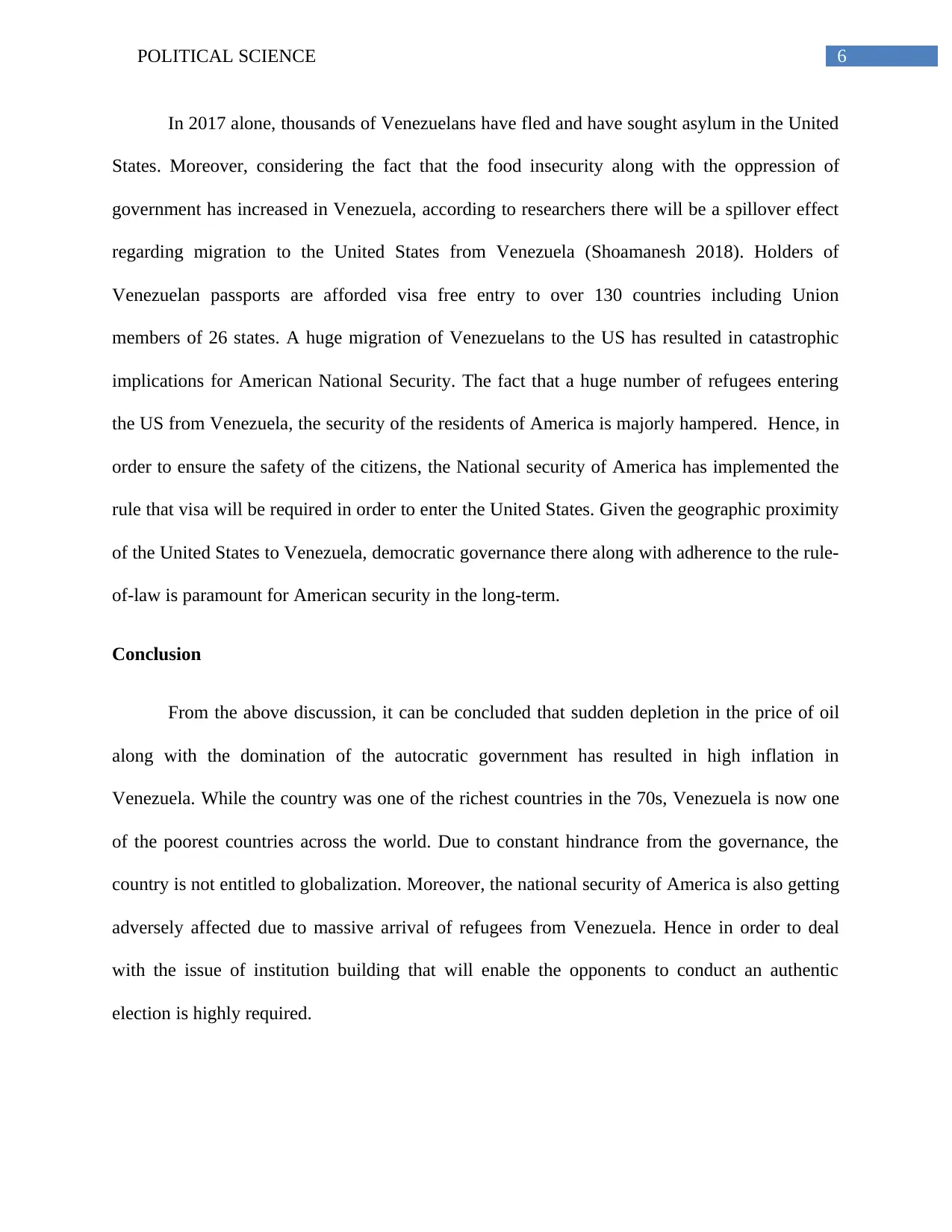
6POLITICAL SCIENCE
In 2017 alone, thousands of Venezuelans have fled and have sought asylum in the United
States. Moreover, considering the fact that the food insecurity along with the oppression of
government has increased in Venezuela, according to researchers there will be a spillover effect
regarding migration to the United States from Venezuela (Shoamanesh 2018). Holders of
Venezuelan passports are afforded visa free entry to over 130 countries including Union
members of 26 states. A huge migration of Venezuelans to the US has resulted in catastrophic
implications for American National Security. The fact that a huge number of refugees entering
the US from Venezuela, the security of the residents of America is majorly hampered. Hence, in
order to ensure the safety of the citizens, the National security of America has implemented the
rule that visa will be required in order to enter the United States. Given the geographic proximity
of the United States to Venezuela, democratic governance there along with adherence to the rule-
of-law is paramount for American security in the long-term.
Conclusion
From the above discussion, it can be concluded that sudden depletion in the price of oil
along with the domination of the autocratic government has resulted in high inflation in
Venezuela. While the country was one of the richest countries in the 70s, Venezuela is now one
of the poorest countries across the world. Due to constant hindrance from the governance, the
country is not entitled to globalization. Moreover, the national security of America is also getting
adversely affected due to massive arrival of refugees from Venezuela. Hence in order to deal
with the issue of institution building that will enable the opponents to conduct an authentic
election is highly required.
In 2017 alone, thousands of Venezuelans have fled and have sought asylum in the United
States. Moreover, considering the fact that the food insecurity along with the oppression of
government has increased in Venezuela, according to researchers there will be a spillover effect
regarding migration to the United States from Venezuela (Shoamanesh 2018). Holders of
Venezuelan passports are afforded visa free entry to over 130 countries including Union
members of 26 states. A huge migration of Venezuelans to the US has resulted in catastrophic
implications for American National Security. The fact that a huge number of refugees entering
the US from Venezuela, the security of the residents of America is majorly hampered. Hence, in
order to ensure the safety of the citizens, the National security of America has implemented the
rule that visa will be required in order to enter the United States. Given the geographic proximity
of the United States to Venezuela, democratic governance there along with adherence to the rule-
of-law is paramount for American security in the long-term.
Conclusion
From the above discussion, it can be concluded that sudden depletion in the price of oil
along with the domination of the autocratic government has resulted in high inflation in
Venezuela. While the country was one of the richest countries in the 70s, Venezuela is now one
of the poorest countries across the world. Due to constant hindrance from the governance, the
country is not entitled to globalization. Moreover, the national security of America is also getting
adversely affected due to massive arrival of refugees from Venezuela. Hence in order to deal
with the issue of institution building that will enable the opponents to conduct an authentic
election is highly required.
Paraphrase This Document
Need a fresh take? Get an instant paraphrase of this document with our AI Paraphraser
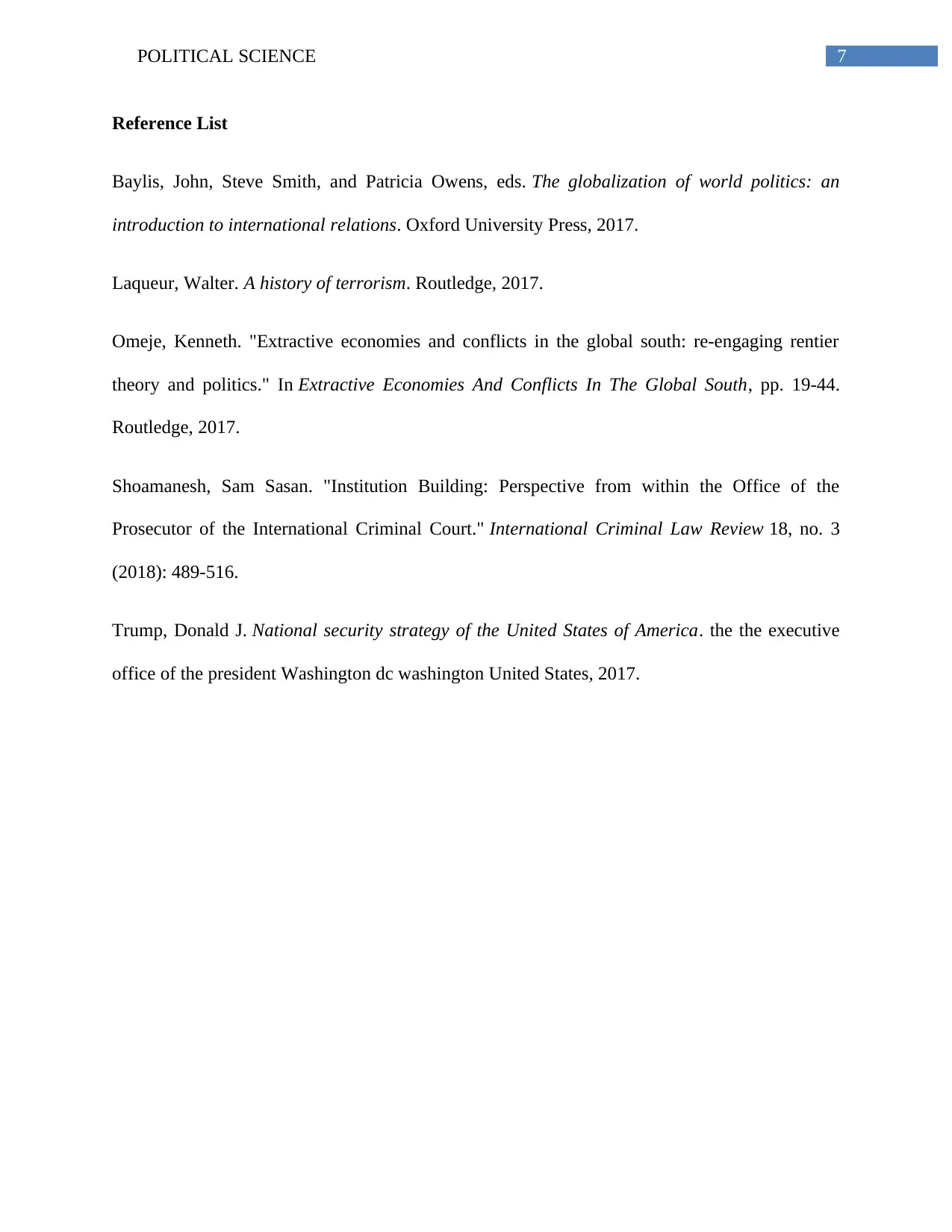
7POLITICAL SCIENCE
Reference List
Baylis, John, Steve Smith, and Patricia Owens, eds. The globalization of world politics: an
introduction to international relations. Oxford University Press, 2017.
Laqueur, Walter. A history of terrorism. Routledge, 2017.
Omeje, Kenneth. "Extractive economies and conflicts in the global south: re-engaging rentier
theory and politics." In Extractive Economies And Conflicts In The Global South, pp. 19-44.
Routledge, 2017.
Shoamanesh, Sam Sasan. "Institution Building: Perspective from within the Office of the
Prosecutor of the International Criminal Court." International Criminal Law Review 18, no. 3
(2018): 489-516.
Trump, Donald J. National security strategy of the United States of America. the the executive
office of the president Washington dc washington United States, 2017.
Reference List
Baylis, John, Steve Smith, and Patricia Owens, eds. The globalization of world politics: an
introduction to international relations. Oxford University Press, 2017.
Laqueur, Walter. A history of terrorism. Routledge, 2017.
Omeje, Kenneth. "Extractive economies and conflicts in the global south: re-engaging rentier
theory and politics." In Extractive Economies And Conflicts In The Global South, pp. 19-44.
Routledge, 2017.
Shoamanesh, Sam Sasan. "Institution Building: Perspective from within the Office of the
Prosecutor of the International Criminal Court." International Criminal Law Review 18, no. 3
(2018): 489-516.
Trump, Donald J. National security strategy of the United States of America. the the executive
office of the president Washington dc washington United States, 2017.
1 out of 8
Your All-in-One AI-Powered Toolkit for Academic Success.
+13062052269
info@desklib.com
Available 24*7 on WhatsApp / Email
![[object Object]](/_next/static/media/star-bottom.7253800d.svg)
Unlock your academic potential
Copyright © 2020–2026 A2Z Services. All Rights Reserved. Developed and managed by ZUCOL.

